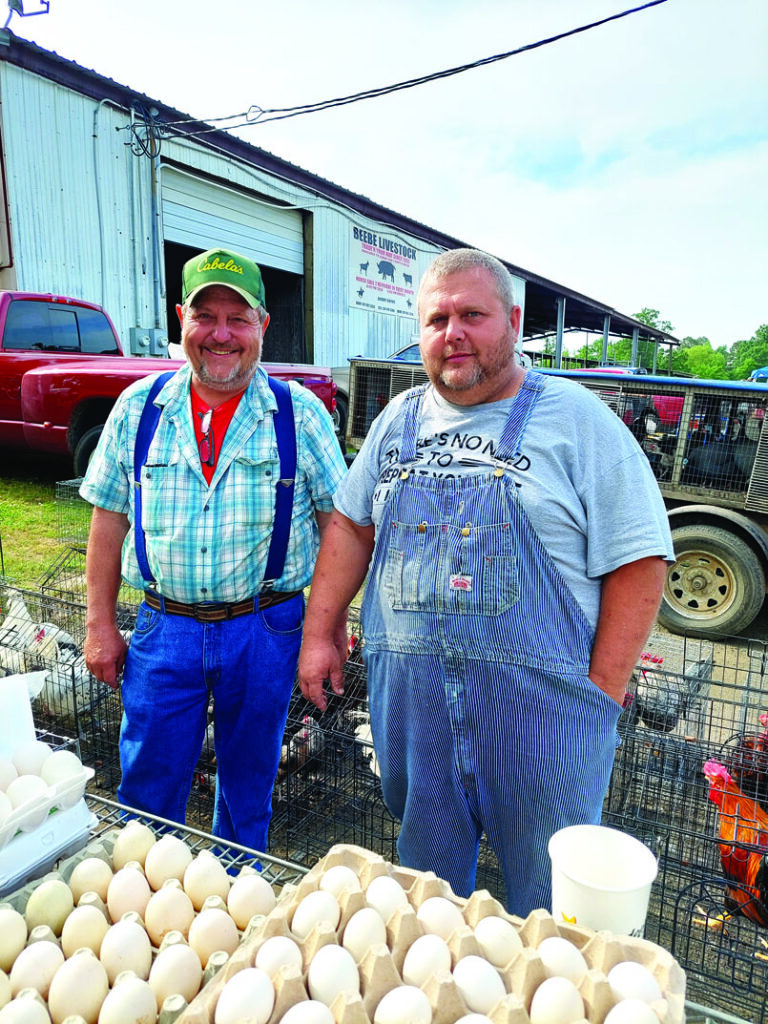30 Jun 2022 Chick magnates
Story and photos by Judy Riley
Which came first, the chicken or the egg?
For Joe Turney of Cabot, it was definitely the chicken. At the tender age of 10, he launched what would become his life’s passion when his dad let him buy a pair of bantam chickens. Joe and his brother, Richard, have 86 breeds of heritage chickens. In chicken circles, that means the chickens are purebred with the same characteristics they had when settlers raised them. Together with help from their dad, the brothers turned their passion into a business.

Joe and Richard grew up fascinated with chickens. Today they operate as Turney’s Poultry and sell to prospective poultry buyers mostly by word of mouth. And they are regular vendors at the Beebe Flea Market on Saturday mornings. They breed, hatch, and raise their own chickens on their farm in the Cabot area. Richard takes care of the hatchery while Joe manages the brooding house. That’s where baby birds are given special attention, including specific food and heated or cooled surroundings, depending on the weather.
They sell eggs ready to eat and eggs ready to hatch, as well as a sampling of heritage breeds. Joe says his most popular selling birds are the Chocolate Mottled Orpingtons. They grow quickly and lay large brown eggs. Many buyers prefer brown eggs. The color of the shell is not an indicator of quality or different nutrient content, according to Joe. He thinks it’s more of a nostalgic thing; it makes people think of the eggs served at their grandparents’ breakfast table.
Another breed commonly sold for backyard flocks is the Welsummer. They are large red and black chickens often depicted on weather vanes and were the icon on Kellogg’s cereal products. The Turney’s novelty birds include Polish Puffs. The females have what appears to be a powder puff on their heads, while the males have a head plume that looks like a feather duster.
One of the positive outcomes from the COVID-19 pandemic was an increased interest in folks knowing where their food comes from and having time to raise chickens. According to Joe, there was an explosion of interest in the beginning of the pandemic. In towns where rules permitted, people were quickly buying various heritage varieties to produce their own eggs. A good hen can lay up to one egg a day and continue doing that for two to three seasons. If a rooster is involved, the eggs can become fertile, making it possible to raise baby chicks.
Joe and Richard take pride in the quality of their birds. They are certified through the National Poultry Improvement Plan, which means they follow USDA-recommended practices for how they care for the birds. None of their birds are allowed to be free range in order to protect the health of the flock from diseases transmitted by migratory birds. The Turney’s like selling “face to face” so they can talk about the heritage of the birds and answer questions about their care.
Joe and Richard are, in fact, chicken collectors. They love caring for the birds and doing their part to perpetuate heritage breeds. In their own way, they make the world a better place, creating satisfied customers who can raise their own flock. With a Saturday morning trip to the Beebe Flea Market, one can learn about the diversity and value of heritage poultry and tap into an experienced poultry man’s knowledge of all things chicken. Joe and Richard will show examples of different birds and the eggs they produce. With a little help from the Turneys, it’s possible to get into backyard poultry with a continuing supply of one’s own homegrown eggs or meat.








